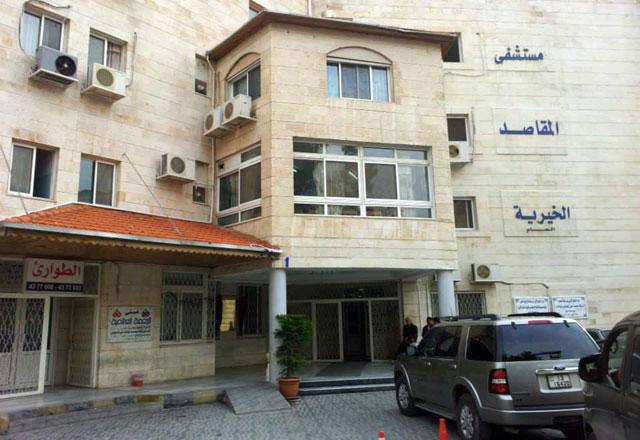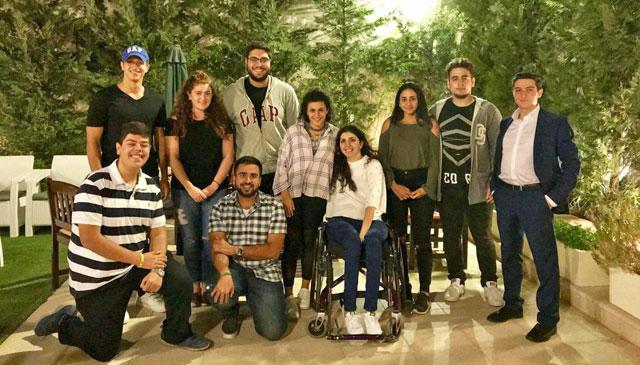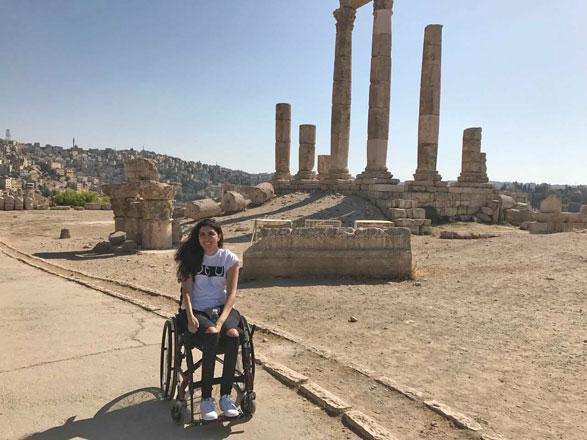You are here
‘Access to healthcare is a right, not a privilege’ for people with disabilities
By Camille Dupire - May 08,2018 - Last updated at May 08,2018

All hospitals and healthcare providers are required to have ramps or accessible facilities according to the new law on disability (File photo)
AMMAN — A video recently released by the Higher Council for the Rights of Persons with Disabilities (HCD) highlighted the difficulty faced by people with disabilities (PWD) to access healthcare services in Jordan.
"Following the endorsement of the new law on the rights of people with disabilities in May 2017, we have worked hand in hand with the Greater Amman Municipality to ensure the right of all people to access healthcare services without discrimination," Ghadeer Al Haris, HCD media spokesperson told The Jordan Times, adding "members of our team decided to go to one of Amman's most popular streets in terms of healthcare services — Al Khalidi Street — to film a video assessing the extent to which people with lowered mobility are able to access clinics and healthcare services".
For Aya Aghabi, founder of Accessible Jordan, a website that aims to promote accessibility across the Kingdom, "many people in Jordan take for granted the ease of reaching a doctor, clinic, healthcare provider or hospital whenever they need it".
Enough doctors, too few accessible ones
Despite thousands of doctors graduating from universities every year, accessibility to healthcare services is still highly unequal for patients across the Kingdom. Most online resources do not provide information related to physical accessibility to the building and very few private practices are equipped with wheelchair friendly accommodation such as ramps or elevators.
Acknowledging her luck to live in the capital, where the number and diversity of healthcare providers is "more than sufficient", Aghabi pointed out that "there is still a huge issue in terms of healthcare accessibility".
After she suffered from a spinal cord injury in 2009 which left her unable to use her legs, Aghabi said her biggest challenge was not to be in a wheelchair but "to reach a doctor in this wheelchair".
"Every time I need medical attention, I have to find doctors based on the accessibility of their clinic or if they can come see me at my house. I do not have the luxury to pick a doctor based on their experience or reputation," she stressed, noting that "many times, my mom has to go see doctors on my behalf and explain to them my medical need without them seeing me in person".
She recalled countless times when she would make an appointment only to find out upon arrival that the building was not accessible.
Danger for PWD's long term healthcare
For Jordanian Lana Bataineh, whose degenerative neurological condition (ALS), left her paralysed from the neck down, one of the biggest frustrations is not her inability to move freely, but rather to be "mostly unable to see a doctor or a dentist when needed".
"The majority of doctors and dentist clinics here [in Jordan] do not have access for wheelchairs: they either do not have ramps, or their clinics are in buildings with an elevator that is too small for any wheelchair," she explained in a post titled "Wheelchair Inaccessibility" on Loofyonline, noting that "whenever I have my regular check up at the doctors, I am obliged to admit myself into the emergency ward at the hospital instead".
Bataineh said it took her two years to find a dentist that is wheelchair friendly, "which was a big ordeal since regular dental checkups is a necessity for ALS patients".
"Before I go anywhere, I always need to do a site-check ahead of making the trip. I need to check if it is wheelchair accessible, people might think ‘but aren’t there elevators in most buildings?’, well, wheelchairs do not fit in most elevators, which is a minor oversight with building regulations in Jordan," she explained, adding: "if everything is ok, I have to pray I don’t need to use the bathroom as the bathroom stalls are definitely too small to fit wheelchairs."
Efforts 'ongoing' to improve the situation
Following the shooting of the HCD video, specific accessibility issues were pointed out, she said, citing the example of trees on the pavements, which prevent the free circulation of people with reduced mobility.
"We are working to keep people aware of the difficulties PWDs encounter in simple everyday life acts like going to the doctor and we want to push healthcare providers to become accessible as quickly as possible so as to enable every citizen to reach these services whenever they need to," she stressed.
The HCD official noted that the new law stipulated the need for all healthcare facilities across the Kingdom to become fully accessible according to a specific timeline, whose details can be found on the Council's website, both in Arabic and English.
For Zaid, a dentist whose practice is located at the fourth floor of a private building in Sweyfieh: "It is not a lack of willingness from our part, but it is true that this is not only our first concern."
"We have an elevator in the building, but it often breaks down and it takes days before technicians can come fix it. Meanwhile, it is true that it becomes impossible for our physically impaired patients to access our clinic," the dentist, who preferred to go by his first name, said.
Right, not privilege
"Access to healthcare is a right and not a privilege," stressed Aghabi, adding: "I should be able to go to any doctor I want without having to worry about stairs, if I will be allowed to park in the building’s underground parking so I can access the building or any other barriers that have simple solutions."
She called on all clinics or medical providers to "be clear about their accessibility and the services they do provide so no one has to go through the trouble I went through and not be able to get the treatment needed".
For Aisha Shahadeh, trips to the doctor for her son have become "a continuous hassle". "We face challenges in parking, building accessibility, and even doctor's office accessibility. It is usually one or more problems at each visit," she told The Jordan Times, noting that "most secretaries do not even understand exactly what accessibility entails".
She cited other problems including the height of examination beds which are often non adjustable for patients with reduced mobility, preventing them from easily transferring on to them, a remark echoed by Aghabi who pointed out that many women with mobility impairments are often unable to access breast and cervical cancer screening mammography equipment "because they only accommodate women who are able to stand".
"All people with disabilities have the same healthcare needs as everyone else in society and equally require access to these services," said the founder of AccessibleJordan.com, which is soon scheduled to provide a detailed list of the accessible health facilities in Jordan.
Related Articles
AMMAN — Aya Aghabi, a 28-year-old Jordanian woman known for her activism for women’s rights and people with disabilities, passed away on Mon
AMMAN — When she was first interviewed by The Jordan Times two months ago, Aya Aghabi, a 26-year-old wheelchair user, had launched the websi
AMMAN — Coming to the realisation that people with disabilities in Jordan could not enjoy a daily life of entertainment as they wish to, Aya



















